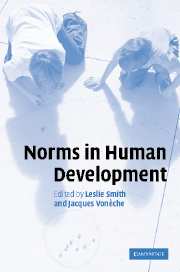1 - Norms in human development: introduction
Published online by Cambridge University Press: 22 September 2009
Summary
Introduction
The central issue is both general and well known as being problematic. It concerns the relation between the factual and the normative, between ‘what is the case’ on the one hand, and ‘what has to be done’ or ‘what has to be’ on the other. This issue is fundamental and recognized to have a direct relevance to contemporary neuroscience (Changeux, 2000; Damasio, 2003) and to current philosophy (Goldman, 2001; Nozick, 2001; Putnam, 2002). The particular version of the question at issue in this book is normativity in developmental psychology (DP).
The question ‘Can DP deal with normativity?’ has a standard answer ‘No’. In outline, the argument for this answer runs like this. DP is an empirical science whose domain of investigation comprises developmental facts for description and explanation. Since norms are not facts, normativity does not fall within DP's domain of investigation. Further, normativity is itself a complex notion, suitable for philosophical, but not scientific, investigation. Philosophers have identified two classes of norms, concerning ‘what has to be’ and ‘what has to be done’. Neither amounts to ‘what is the case’, so neither is in the scientific domain. The conclusion seems inescapable. DP does not deal with normativity, nor is normativity on DP's list of outstanding problems. Chemistry long ago parted company from alchemy. Astronomy long ago ceased to address the question of whether human destiny was written in the heavens. So too, this answer runs, DP ought to leave normativity out.
- Type
- Chapter
- Information
- Norms in Human Development , pp. 1 - 32Publisher: Cambridge University PressPrint publication year: 2006
- 22
- Cited by



